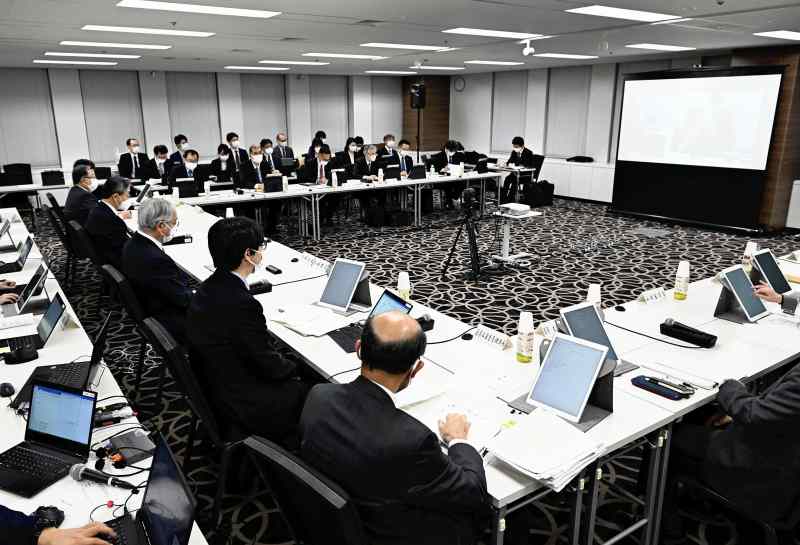
An expert panel of the Health, Labor and Welfare Ministry discusses whether to grant emergency approval to a COVID-19 pill developed by Shionogi & Co., in Chiyoda Ward, Tokyo, on Tuesday.
17:11 JST, November 23, 2022
The health ministry has granted emergency approval for a COVID-19 pill developed by Shionogi & Co., opening the door for Japan’s first domestically produced oral medicine for the virus to become available as soon as early December.
Xocova was the first drug subject to consideration under an emergency approval system established in May to quickly evaluate medications. It requires a prescription from a doctor and will be for patients aged 12 or over who have mild to moderate symptoms. The drug stands apart because even people at low risk of becoming seriously ill can take it.
Patients will take the drug once a day for five days, starting within three days of developing symptoms.
The government has signed a contract to purchase 1 million courses from Shionogi. The emergency approval will last for one year, and the government will again consider granting regular approval for Xocova after confirming its effectiveness and other factors.
An expert panel of the Health, Labor and Welfare Ministry decided at a meeting in July not to grant fast-track approval for the drug because “it cannot be concluded that its efficacy can be presumed.” This decision came after intermediate-stage clinical trials did not make it sufficiently clear that Xocova improved overall the 12 symptoms associated with COVID-19.
At the panel’s latest meeting, the experts reconsidered the drug based on additional data supplied by Shionogi following final-stage clinical trials. A majority of panel members agreed to approve Xocova because it shortened by about 24 hours the time needed for five common symptoms of COVID-19’s currently dominant omicron variant to clear up — such as a sore throat, cough and fever.
New treatment option
Expectations are high for this drug, which will be available to the vast majority of the population. However, Xocova’s inability to be taken in combination with many other medications is among the issues that make it difficult to tell whether it will help the nation get used to “living with COVID-19.”
Many panel members were positive about Xocova at their meeting Tuesday.
“Having a domestically produced drug will increase the treatment options available,” one attendee said.
So far, two types of pills — produced by U.S. pharmaceutical companies Merck & Co. and Pfizer Inc. — have been made available in Japan. Although these medications can be used for patients with mild symptoms, they are being administered only to patients at high risk of serious illness. Young people with no chronic conditions have mainly been treated with medication such as pain relievers and fever reducers when they develop symptoms.
Xocova differs significantly from the U.S.-made drugs because it also could be used by such people.
Clinical trials confirmed Xocova reduced the amount of the virus in a patient’s body on the fourth day after taking the pills. It also reduced the time taken for five symptoms — sore throat, cough, fever, runny nose and fatigue — to disappear.
“This drug can be expected to reduce the number of people who suffer from long COVID and also lower the risk of people spreading the virus to others,” said St. Marianna University Prof. Hiroyuki Kunishima, an expert on infectious diseases.
Although having a domestically produced COVID-19 drug is expected to ensure a stable supply will be available, many questions remain over how Xocova will be used in medical settings.
Patients will not be charged for the time being.
However, Xocova cannot be used together with 36 kinds of medication, including some taken for treating high blood pressure or hyperlipidemia. Pregnant women also cannot be given Xocova due to concerns the drug could impair fetal development.
Establishing a system that can quickly deliver Xocova will be crucial because the medication’s efficacy declines from the fourth day after symptoms appear. It was initially anticipated that prescriptions would be issued in limited cases after online medical consultations, but there are concerns that a spike in COVID-19 cases could trigger a surge in patients who visit a doctor after developing a fever.
An additional point of concern is that Xocova has so far not demonstrated an ability to prevent serious illness, unlike drugs made by Pfizer and other companies.
Top Articles in Society
-

Man Infected with Measles Reportedly Dined at Restaurant in Tokyo Station
-

Man Infected with Measles May Have Come in Contact with Many People in Tokyo, Went to Store, Restaurant Around When Symptoms Emerged
-

Woman with Measles Visited Hospital in Tokyo Multiple Times Before Being Diagnosed with Disease
-

Australian Woman Dies After Mishap on Ski Lift in Nagano Prefecture
-

Foreign Snowboarder in Serious Condition After Hanging in Midair from Chairlift in Nagano Prefecture
JN ACCESS RANKING
-

Japan PM Takaichi’s Cabinet Resigns en Masse
-

Japan Institute to Use Domestic Commercial Optical Lattice Clock to Set Japan Standard Time
-

Israeli Ambassador to Japan Speaks about Japan’s Role in the Reconstruction of Gaza
-

Man Infected with Measles Reportedly Dined at Restaurant in Tokyo Station
-

Videos Plagiarized, Reposted with False Subtitles Claiming ‘Ryukyu Belongs to China’; Anti-China False Information Also Posted in Japan
























